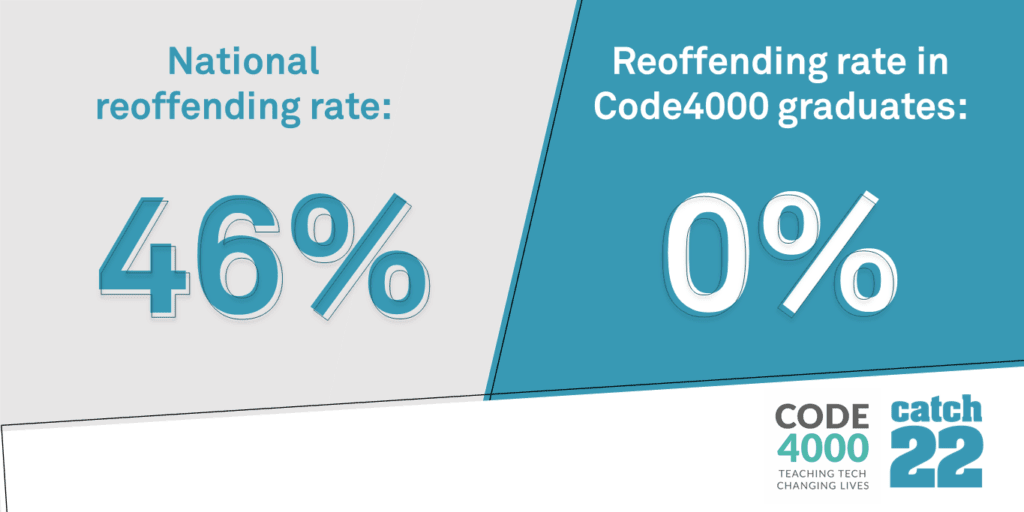Code4000 and Catch22 announce merger to further reduce reoffending rates

Technology enterprise Code4000 (@code4000uk) and social business Catch22 (@Catch22) have announced their intent to merge, expanding their work to develop prison talent while filling huge digital skills gaps.
Catch22 works with more than 38,000 people across 18 prisons in the UK, providing intervention and rehabilitation services in prison and in the community.
Code4000 trains prisoners in coding in HMP Holme House, HMP Wandsworth, and HMP Humber. Compared to a national reoffending rate of 46%, none of Code4000’s graduates have returned to prison.
The combined efforts of Code4000 and Catch22 will allow them to continue to reduce reoffending rates by setting individuals up for sustainable careers in software development, the greatest skills gap facing the country.
This innovative training could eventually expand into Catch22’s wider education and employability provision, including in their alternative provision schools and colleges across the country, developing young people with essential digital skills for the future.
Catch22 CEO Chris Wright says:
“Code4000’s work embodies our reform agenda by using education and employment to transform the criminal justice system, in keeping with the Government’s vision for prison leavers.
“We need better education provision in prisons and we need sustainable pathways which give prison releasees a real shot at restarting their lives. We are thrilled to back one of the most forward-thinking organisations delivering such change.”
Code4000 CEO Michael Taylor says he hopes the merger with accelerate their growth:
“We are delighted at Code4000 to find a new home for our prisoner coding programme at Catch22. Having such a prestigious partner working in the justice sector means we will be better placed to expand to other prisons across the UK, and also draw down on Catch22’s long-standing commitment to developing the employability of talent within prisons. Being at Catch22 will also mean building new fruitful partnerships with UK businesses and tech firms.”
Code4000 graduate Franky, who spent two years on the programme, says:
“Since arriving in prison, I’d worried about what I was going to do when I was released. Being on the Code4000 course really focussed my plans, I could see a path that had not been available to me before. I also enjoyed it. I didn’t have any coding experience before, and it was great to learn. I’d also never worked in an office environment and this gave me a sense of normality.”
Thanks to the early support from Lloyds Banking Group, who were looking to develop an open and inclusive apprenticeship programme, along with the holistic support offered by Code4000, Franky started his role as an Apprentice Software Engineer in 2020.
“Before I went to prison, I never saw myself in this position. Code4000 have been unbelievably supportive. Prison can be an isolating place and you can sometimes feel that nobody cares, that nobody is there to help you, but the Code4000 course was different and everyone involved, both inside and outside HMP Humber, were great throughout.”
Across Catch22’s resettlement work in prisons and in the community, Catch22 wants to see prisoners given education plans which are integrated into their sentencing plans – leading directly to sustainable jobs that match the local need, which will directly impact reoffending rates.
Andrew Dixon, founder of The Woodhaven Trust, who has supported Code4000 since its inception says the team has progressed thanks to the vision, leadership, and “tireless commitment” Michael Taylor has to this work.
“He and his team have made wonderful progress in a very challenging sector. I am a great admirer of Catch22 and therefore delighted with this merger. I am in no doubt that the combined entity will play a vital role in reducing reoffending rates. As an investor in entrepreneurial software businesses, it is vital that we provide young people with these essential digital skills.”
Chris Wright adds:
“Lack of digital skills and access is causing some of society’s most vulnerable – those out of work or training, those in alternative provision schools, and those leaving prisons – to slip further behind.
“Leading organisations, including Microsoft, Google, and Barclays have already recognised the importance of our ambition to nurture unconventional and diverse talent. As we work to finalise the merger, we’ll be looking to expand our network of partners too.”
Last year, Code4000 won the Tech for Good award at the annual TeesTech Awards for their work at HMP Holme House and are previous winners of the national Vodafone Techstarter Award in the not-for-profit category.
The merger is expected to be finalised by September 2021.











Responses